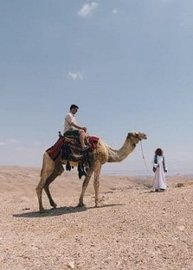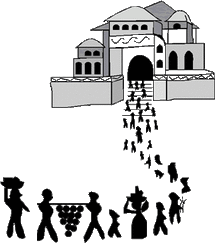Deuteronomy 26:5-10 "Wandering Aramean

The Christian life is dependent on claiming the story of the people of God as our own. As children of God, we are adopted into the story of faith. This scripture passage is the story that the Hebrew people were to tell when they brought their first fruits to God (at Shavuot, which we know as Pentecost). In telling this story, they remembered why they served God, why they worshipped, why they brought their offerings. Claiming the wandering Aramean (Abraham) as our ancestor and claiming God’s saving act of grace as our story is part of our faith journey. It helps us and our children know why we serve God. And it is empowering for children to claim those stories in their Bible as their story.
Read It
“A wandering Aramean was my ancestor; he went down into Egypt and lived there as an alien, few in number, and there he became a great nation, mighty and populous. When the Egyptians treated us harshly and afflicted us, by imposing hard labor on us, we cried to the Lord, the God of our ancestors; the Lord heard our voice and saw our affliction, our toil, and our oppression. The Lord brought us out of Egypt with a mighty hand and an outstretched arm, with a terrifying display of power, and with signs and wonders; and he brought us into this place and gave us this land, a land flowing with milk and honey. So now I bring the first of the fruit of the ground that you, O Lord, have given me.” You shall set it down before the Lord your God and bow down before the Lord your God." - Deuteronomy 26:5-10
Memorize It
The whole thing, if you want to be ambitious!
Or just Deuteronomy 26:5b - “A wandering Aramean was my ancestor.”
Or just Deuteronomy 26:5b - “A wandering Aramean was my ancestor.”
Do It

Bring Your Offerings
1. Set up an altar in your home. This could be as simple as a cloth with an LED candle on it.
2. Choose your “first fruits.” This could be the first produce out of your garden, or one of the cookies you just made together, or artwork your family members have made, or money. Let each member of your family decide what “first fruit” they would like to bring. It should be something they feel ownership in and are proud of.
3. Bring your first fruits to the altar. Kneel down and read this month’s passage. Lay your first fruits on the altar. If you really want to make this fun, do a first fruits parade. At Shavuot, the Hebrew people would process to the temple with their first fruits. Do a parade around outside your house before coming to the altar.
4. As a family or as parents, choose someone with whom to share the first fruits you offered to God. In other words, don’t just leave them sitting on the altar, be God’s hands and feet by giving them away.
For older children:
Name the modern-day equivalents of the characters in this story. The “wandering Aramean” was an immigrant, etc. Because of our ownership of this story we also have kinship with them. Read their stories together. Some good resources are Immigrant Stories and End Slavery Now.
1. Set up an altar in your home. This could be as simple as a cloth with an LED candle on it.
2. Choose your “first fruits.” This could be the first produce out of your garden, or one of the cookies you just made together, or artwork your family members have made, or money. Let each member of your family decide what “first fruit” they would like to bring. It should be something they feel ownership in and are proud of.
3. Bring your first fruits to the altar. Kneel down and read this month’s passage. Lay your first fruits on the altar. If you really want to make this fun, do a first fruits parade. At Shavuot, the Hebrew people would process to the temple with their first fruits. Do a parade around outside your house before coming to the altar.
4. As a family or as parents, choose someone with whom to share the first fruits you offered to God. In other words, don’t just leave them sitting on the altar, be God’s hands and feet by giving them away.
For older children:
Name the modern-day equivalents of the characters in this story. The “wandering Aramean” was an immigrant, etc. Because of our ownership of this story we also have kinship with them. Read their stories together. Some good resources are Immigrant Stories and End Slavery Now.
Pray It
God, thank you for adopting us into your story. Help us to continue your story, living in gratitude for who you are and what you have done. In Jesus’ name, Amen.
